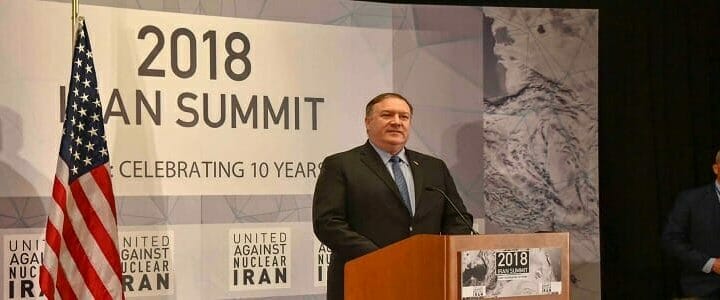The International Court of Justice (IJC), which settles legal disputes between nations, largely arising from disagreements over interpretation of treaty provisions, has found itself in hot water with the Trump administration following a ruling on U.S. sanctions against Iran. The court ruled that the U.S. must lift certain sanctions reimposed after its withdrawal from the Joint Comprehensive Plan of Action (JCPOA) in May, the so-called “Iran Nuclear Deal,” saying they violated the terms of a the 1955 “Treaty of Amity” between Iran and the United States.
By noon in Washington, Secretary of State Mike Pompeo had announced that the U.S. was withdrawing from that treaty. National Security Adviser John Bolton told the White House press corps that the administration was also withdrawing the country from the Optional Protocol and Dispute Resolution to the Vienna Convention on Diplomatic Relations. (The nation remains a party to the full Vienna convention, he stressed).
a recent history of U.S. sanctions against iran
The Treasury Department reimposed some sanctions against the Islamic Republic of Iran in August. The remaining pre-JCPOA sanctions go back into affect on November. Siding with Iran in part, the IJC (not to be confused with the International Criminal Court) ordered the U.S. to allow Iranian imports of humanitarian items such as medicines and medical devices, food and “agricultural commodities,” and aircraft parts (and services) to ensure the safety of civil aviation.
The court did not, however, grant Iran’s request for much more expansive relief from sanctions beyond those exemptions. For its part, the U.S. argued that it already allows shipments of food and medicine to Iran, and allows the provision of aircraft parts and services on a case-by-case basis.
So rather than continue to deal with this issue in the IJC, the U.S. withdrew from the Treat of Amity.
Iran’s theocrats render pre-revolution treaties worthless
In announcing the withdrawal, Pompeo said it was “a decision, frankly, that is 39 years overdue.” I, and many others, thought the same thing when we first heard about the IJC’s ruling Wednesday morning. If anything, I said to anyone who would listen (and a few who wouldn’t), Iran tore up that treaty on November 4, 1979 when they took 52 American diplomats hostage. If it did not do so on that exact date, it did so sometime during the 443 days that followed.
The idea that any treaty between the U.S. and Iran, signed prior to the Iranian Revolution that sent the shah into exile and brought the ayatollahs to power, would remain in effect today is laughable. Iran’s theocrats have abrogated that pact many times over.
Pompeo added that the U.S. government is “disappointed that the court failed to recognize it has no jurisdiction to issue any order relating to these sanctions measures with the United States, which is doing its work on Iran to protect its own essential security interests.”
While I cannot speak to Pompeo’s legal argument directly, he does echo what President Donald Trump said in his address to the United Nations General Assembly just a week ago. Yes, with everything else that’s happened in the last week, it’s hard to realize that Trump’s speech was only last Tuesday. While the president spent a lot of time discussing hot-spots like Iran, North Korea, and Venezuela, the theme that ran through his speech was sovereignty.
the sanctity of the nation-state
Since Europe’s Thirty Years’ War ended with the Peace of Westphalia in 1648, the state has been the world’s primary political entity, responsible only to itself and its people for the conduct of affairs within its borders. The formal concept of nation-states – political entities organized around a group of people who share an ethnic, cultural, and linguistic heritage – didn’t come until later. The U.S. (i.e., traditional) view of sovereignty is that the U.N. is powerless to dictate American internal affairs.
The U.S. is therefore free to tell corporations under its jurisdiction that they may not sell goods to Iran. It is also free to tell corporations in other nations that if they sell goods to Iran, they will lose access to the U.S. banking system. Almost none of them can afford to take that chance, so sanctions go into effect.
The point of all of this is, of course, to cripple the Iranian economy to the point where, as Pompeo said he hopes, “Iran’s leaders will come to recognize that the only way to secure a bright future for its country is by ceasing their campaign of terror and destruction around the world.”
With Wednesday’s announcements, the U.S. vigorously reasserted its sovereignty. The U.N. should take notice.




